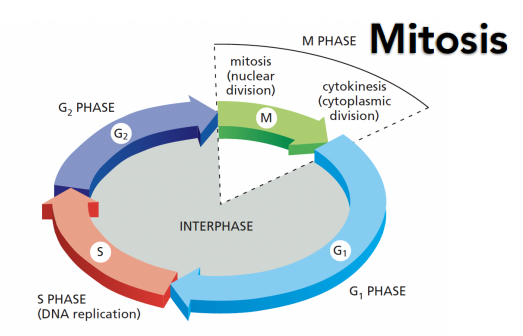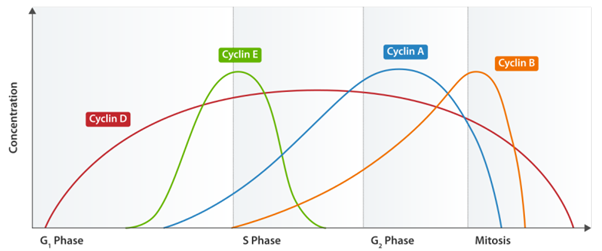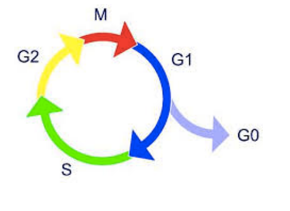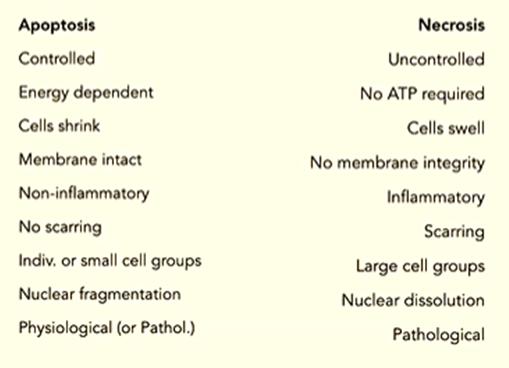Cell cycle and apoptosis
5.0(1)
Card Sorting
1/28
There's no tags or description
Looks like no tags are added yet.
Last updated 10:55 AM on 5/16/23
Name | Mastery | Learn | Test | Matching | Spaced | Call with Kai |
|---|
No analytics yet
Send a link to your students to track their progress
29 Terms
1
New cards
What is the importance of mitosis and cell cycle?
· Used for normal growth, development and maintenance of tissues in the body e.g. skin.
· The frequency of cell division varies at different sites in the body.
· Different factors e.g. trauma may stimulate cells to proliferate at a faster or slower rate than normal.
2
New cards
What is cell cycle?
· An ordered set of events leading to cell growth and division (mitosis). Mitosis is one of the steps in the cell division process.
· Produces two identical daughter cells.
· The DNA is duplicated and divided evenly.
3
New cards
WHat are the phases of cell cycle?
There are four major phases of the cell cycle:
1\. G1
2\. S-Phase
3\. G2
4\. Mitosis
G1, S & G2 together are known as interphase
At the end of mitosis, cytokinesis (the division of the cytoplasm into two daughter cells) occurs.

4
New cards
What is cytokinesis?
\
the actual division of the cell cytoplasm into 2 daughter cells
\
this at end of mitosis
the actual division of the cell cytoplasm into 2 daughter cells
\
this at end of mitosis
5
New cards
What are the phases of mitosis?
Then we have 5 phases of mitosis: (PPMAT)
\
* **Prophase** - chromosomes in nucleus condense
\
* **Prometaphase** - fragmentation of nuclear envelope to allow seperation
\
* **Metaphase** - Chromosomes align into the middle of the cell, spindle forms on each side
\
* **Anaphase** - Chromosomes separate - due to contraction of spindle
\
* **Telophase** - The nuclear envelope reforms around
the separated chromosomes followed by cytokinesis (division of cytoplasm)
\
* **Prophase** - chromosomes in nucleus condense
\
* **Prometaphase** - fragmentation of nuclear envelope to allow seperation
\
* **Metaphase** - Chromosomes align into the middle of the cell, spindle forms on each side
\
* **Anaphase** - Chromosomes separate - due to contraction of spindle
\
* **Telophase** - The nuclear envelope reforms around
the separated chromosomes followed by cytokinesis (division of cytoplasm)
6
New cards
What is the significance of the g phases (G1 and G2)?
G1 and G2 are gap phases
important for regulatory mechanisms of the cell cycle
the cell must have the optimum conditions for growth (no mutations
important for regulatory mechanisms of the cell cycle
the cell must have the optimum conditions for growth (no mutations
7
New cards
Significance of S phase?
dna is replicated
8
New cards
How is the cell cycle regulated?
1) Extra & intracellular signals e.g. growth factors which influence whether a cell should enter the cell cycle
2)Checkpoints at different stages of the cell cycle which monitor whether the DNA has any damage, or has replicated correctly and whether the cell has enough nutrients
2)Checkpoints at different stages of the cell cycle which monitor whether the DNA has any damage, or has replicated correctly and whether the cell has enough nutrients
9
New cards
What are the checkpoints of regulation of cell cycle?
at G1, G2 and M phase:
G1- Checks for levels of Nutrients, Molecular Signals- determines whether a cell enters the cycle or not.
G2- DNA integrity and DNA replication.
M Phase- Checks if spindle is correctly attached to the chromosomes.
10
New cards
What happens if there are any problems at any of the regulation checkpoints?
Cycle is Interrupted (e.g. for DNA damage mechanisms to correct the problems)
Cell Apoptosis - if the problem cannot be resolved.
11
New cards
What are cyclins?
Cell-cycle control system: family of protein kinases known as **cyclin dependent kinases (Cdks)**
Cyclin levels regulate Cdks
Cyclins undergo pattern of production and degradation so levels of cyclins affect the phases of the cell cycle (while level of Cdk proteins are constant)
Cyclin levels regulate Cdks
Cyclins undergo pattern of production and degradation so levels of cyclins affect the phases of the cell cycle (while level of Cdk proteins are constant)
12
New cards
Which cyclins affect cell cycle
* **Cyclin D - For G1**
* **Cyclins E + A - For S-Phase**
* **Cyclins B + A - For M-Phase**
* **Cyclins E + A - For S-Phase**
* **Cyclins B + A - For M-Phase**

13
New cards
SO cell cycles controlled by…
o Cyclin and Cyclin dependant kinase synthesis
o Cyclin degradation, Cyclin Dependant Kinase Phosphorylation and Cyclin Dependant Kinase inhibition.
14
New cards
What is phase G0?
when cell is not dividing = resting state - G0
some cells can re enter cell cycle - in response to signals
other cells permanently cant - undergone terminal differentiation
some cells can re enter cell cycle - in response to signals
other cells permanently cant - undergone terminal differentiation

15
New cards
Where is dyregulated cell growth found?
* in dysplasia (abnormal growth with abnormal cells) - pre malignant lesions
* cancer
* cancer
16
New cards
What does chemotherapy do?
o target different stages of the cell cycle- DNA replication, mitosis and cytokinesis and blood vessel growth (angiogenesis- cuts off tumour blood supply).
o Since they target rapidly dividing cells- they aren’t just targeting cancer cells (side effects) It will target: hair cells, blood cells, leukocytes and oral mucosa cells.
17
New cards
What are tumour suppressor genes?
regulatory genes
induce apoptosis if DNA damage is detected
induce apoptosis if DNA damage is detected
18
New cards
What does gene detects DNA damage?
P53 gene detects DNA damage
it produces a protein which induces apoptosis
it produces a protein which induces apoptosis
19
New cards
What happens to p53 in some cancers?
p53 becomes mutated
so DNA damage wont be detected
could lead to uncotrolled cell division
so DNA damage wont be detected
could lead to uncotrolled cell division
20
New cards
Oral mucosa side effects of cancer
Oral Mucositis.
o Presents with extensive necrosis and ulceration (exposed connective tissue- since the rapidly proliferating epithelial cells are damaged).
o Causes difficulty in ability to eat- very painful.
o This exposed connective tissue is very prone to infection.
o Presents with extensive necrosis and ulceration (exposed connective tissue- since the rapidly proliferating epithelial cells are damaged).
o Causes difficulty in ability to eat- very painful.
o This exposed connective tissue is very prone to infection.
21
New cards
How does oral cancer relate to cell cycle?
Oral cancer established when epithelial cells have capacity to invade through the basement membrane enter underlying tissue
undergoes dysregulated cell cycle
undergoes dysregulated cell cycle
22
New cards
What is apoptosis?
programmed cell death- a physiological process.
23
New cards
Purpose of apoptosis?
* it eliminates cells that are no longer needed
* destroys cells that may be a threat - virus infected, diseased, DNA damaged
24
New cards
How is apoptosis initiated?
initiated by:
* withdrawal of positive signals (e.g. growth factors or hormones)
or
* the reception of negative signals (e.g. UV, death activators or hypoxia).
25
New cards
What happens in the process of apoptosis?
* cell shrinks - from chromatin compaction and condensation of cytoplasm
* fragmentation of the nuclear envelope and cell membrane these fragments are called apoptotic bodies
* these can be easily phagocytosed by macrophages
* fragmentation of the nuclear envelope and cell membrane these fragments are called apoptotic bodies
* these can be easily phagocytosed by macrophages
26
New cards
What 2 pathways is apoptosis initiated by?
**Intrinsic pathway (mitochondrial)**
* responds to stimuli such as growth factors (or their withdrawal) and biochemical stress (DNA damage)
* due to activation of Bcl-2 proteins (these regulate apoptosis)
**Extrinsic pathway (death receptor)**
* Ligand-binding at so-called death receptors on the cell surface
\
Both pathways converge upon a final common effector pathway- activation of caspases.
* responds to stimuli such as growth factors (or their withdrawal) and biochemical stress (DNA damage)
* due to activation of Bcl-2 proteins (these regulate apoptosis)
**Extrinsic pathway (death receptor)**
* Ligand-binding at so-called death receptors on the cell surface
\
Both pathways converge upon a final common effector pathway- activation of caspases.
27
New cards
What are caspases?
\
Are proteolytic enzymes responsible for the events of apoptosis
* 2 types of caspases: 1) Initiator and 2) Executioner Caspases
* Activity controlled by a number of mechanisms
Are proteolytic enzymes responsible for the events of apoptosis
* 2 types of caspases: 1) Initiator and 2) Executioner Caspases
* Activity controlled by a number of mechanisms
28
New cards
Apoptosis VS necrosis

29
New cards
apoptosis in oral pathology - lichen planus
\
* Autoimmune mucocutaneous condition
* Most often affects middle-aged adults (women)
* External agents or internal agents (e.g. stress) can alter the basal keratinocytes of the oral mucosa making them susceptible to apoptosis by CD8+ cytotoxic T cell
* results in painful ulceration of mouth
* Autoimmune mucocutaneous condition
* Most often affects middle-aged adults (women)
* External agents or internal agents (e.g. stress) can alter the basal keratinocytes of the oral mucosa making them susceptible to apoptosis by CD8+ cytotoxic T cell
* results in painful ulceration of mouth